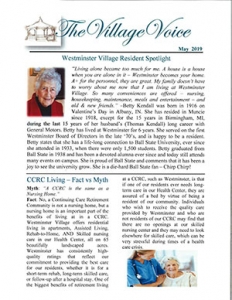Chaplain’s Corner: CXV
“When God Seems Silent”
The most telling argument against Judeo-Christian understanding of the world is the silence of God.
Prayers go unanswered. Children get sick and die. Dictators drag their countries into meaningless wars. Natural disasters claim thousands of lives.
I recently had lunch with a friend who has had enough. The last two years of his life
have included a series of brutal disappointments. “I’m through with God,” he said. “There is no God. How can there be a God when so many reckless, painful, and absurd things keep happening, and no God ever intervenes to do anything about it?”
This experience is so common that you would think the Bible would have something
to say about it. Both Old and New Testaments, in fact have a great deal to say about God’s apparent silence, absence and indifference. Not only that, but history’s most ferocious critics of Christianity-including Voltaire, Bertrand Russell, Richard Dawkins and Friedrich Nietzsche-have not been able to come up with anything more edgy than the bitter complaints voiced by some of the Bible’s key characters.
Job, in the throes of suffering, declares, “From the city the dying groan, and the throat of the wounded cry for help. Yet God pays no attention to their prayer.” (Job 24:12) The Psalmist moans, “Why Lord do you hide your face from me? You have taken from me friend and neighbor-darkness is my closest friend.” (Psalm 88:14,18) God’s own Son cries from the cross, “My God, my God, why have you forsaken me?” (Matthew 27:46)
How can we reasonably assert that God is not only really there but actually cares about human beings? Pat answers will never do.
For those with a complacent faith, the problem of pain can seem like a spiritual deal breaker. But if we become convinced on the other grounds that God is very real indeed-that an exquisitely designed cosmos reveals the work of a creator; that the historical evidence for the resurrection is (in a word) spectacular; and that God can be intimately encountered through our own experiences of miracles, answered prayers, and personal life changes-then it is reasonable to conclude that God best knows how to manage the universe.
Over a year ago we had a patient admitted to Westminster recovering from Covid. Many in the medical community said this patient would never walk again. After a year of physical therapy, nursing care and prayers from the whole Muncie community this patient is not only walking but now is driving. God does in the seeming silence hear our prayers and often (in this patient’s case) allow us to see miracles.
To put it another way, very often, I don’t know why things happen as they do. But I
know why I trust God-and God knows why. That does not take the pain away in some cases. But it draws me into a deeper connection with the God who promised that one day He will wipe away every tear.
Faithfully,
Ron Naylor, Chaplain




